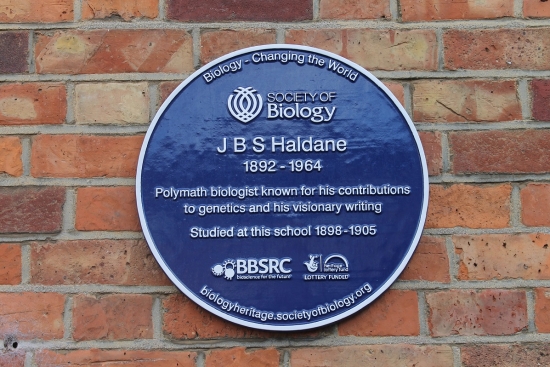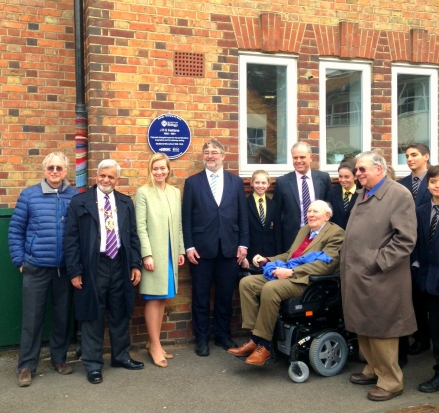News archive
Plaque celebrating JBS Haldane unveiled in Oxford
- Details
- 14 March 2015
A plaque celebrating JBS Haldane, a leading scientist of the 20th century, was unveiled by the Society of Biology today at his old school in Oxford.
John Burdon Sanderson Haldane (1892-1964) was a polymath biologist, known for his contributions to genetics and his visionary writing.
He studied at The Oxford Preparatory School (now The Dragon School) at the turn of the century and went to win many prizes, including the French Legion of Honour, for his mathematical work on genetics, which was critical to acceptance of natural selection.
The Society of Biology installed the blue plaque as part of a new series of ten plaques around the UK celebrating eminent but sometimes unsung heroes of biology.
At the ceremony Professor Douglas Kell FSB, University of Manchester, made a speech:
"The word ‘polymath’ is frequently overused, but John Burdon Sanderson Haldane truly was a polymath. As befits a student who gained a Double First in both Greats (Classics and Philosophy) and Maths at Oxford he spread his wings widely. His scientific contributions were simply immense; he laid the foundation of neo-Darwinism (the combination of evolutionary theory with modern genetics), his contributions in the study of enzymes were profound and lasting, and he was well known as a great populariser of science. There can be few British scientists of whom the word ‘great’ is more deserving."
Professor Sir Walter Bodmer FSB, University of Oxford, also made a speech:
"JBS Haldane was one of the great founders of population genetics, the field that put the study of evolution on a firm mathematical basis on the assumption of Mendelian inheritance. The last time I met him was at the International Congress of Genetics in The Hague in 1963, the year before he died. He was the centre of attention dressed in flowing white Indian robes. He spent the last seven years of his life in India and is enormously appreciated there for what he did for science, and especially for his support for young scientists.”
Haldane is also famous for his witticisms, particularly the response that he allegedly gave when theologians asked him what could be inferred about the mind of the Creator from the works of His Creation: "An inordinate fondness for beetles." This is in reference to there being over 400,000 known species of beetles in the world, representing 40% of all known insect species (at the time of the statement, it was over half of all known insect species).

Richard Dawkins Hon FSB, evolutionary biologist, Sir Roger Bannister, who ran the first sub-four-minute mile in Oxford in 1954, Nicola Blackwood, the Conservative MP for Oxford West and Abingdon, and the Lord Mayor of Oxford, Councillor Mohammed Abbasi, also attended this celebration of the local hero.
The new series of celebratory plaques also include those to: Steptoe, Edwards and Purdy, IVF pioneers, in Oldham; Richard Owen, who invented the word ‘dinosaur’ and founded the Natural History Museum, in Lancaster; and Dolly the sheep, and the team who created her, in Edinburgh.
The ten blue plaques are part of the national Biology: Changing the World project; which also includes a new app, website, public engagement programme and teaching resources. The free app, available in the apple and android app stores, uses your location to introduce you to the great biologists who lived and worked nearby and biological discoveries which were made in the area.
Dr Mark Downs FSB, chief executive of the Society of Biology said:
“We have a great heritage of scientific discovery and an exciting future, but the biologists who have contributed to our understanding of the world are not always given the appreciation they deserve. We are delighted to be giving these biologists the recognition awarded to other great historical figures through Biology: Changing the World. The project is also a celebration of biology and biologists today. The life sciences will be essential for solving the problems of the 21st Century such as food security and antibiotic resistance. By highlighting our great biology heritage we hope to inspire the next generation.”
The Biology: Changing the World project of the Society of Biology was developed in partnership with the Biotechnology and Biological Sciences Research Council (BBSRC) and received funding from the Heritage Lottery Fund.
Professor Jackie Hunter, chief executive of the BBSRC, said:
“I’m delighted that BBSRC has been involved with this scheme to raise the profile of unsung heroes of bioscience who have changed the world with their contributions. We hope that these plaques will spark curiosity and help inspire new generations to get involved in the biosciences, which will continue to change the world and help us meet the challenges of the future.”

